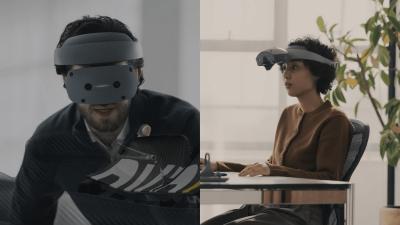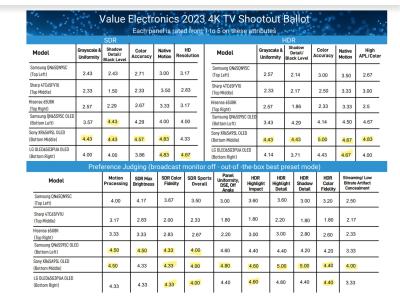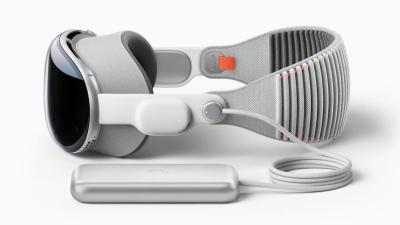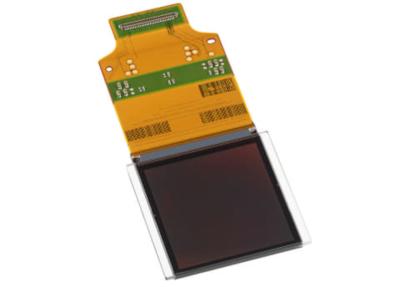Sony demonstrates a professional MR headset based on its 4K OLED microdisplays
Sony is demonstrating an early-stage MR headset, based on dual 1.3" 4K OLED microdisplays (or at least this is what is assumed, as Sony did not exactly detail the displays). The headset, which isn't yet a product, uses Qualcomm's XR2+ Gen 2 processor, includes passthrough video (soft-AR), and unique controllers. Sony said its headset is "primarily designed for professionals who work with 3D".
It is likely that this headset uses Sony's ECX344A displays - which are actually 1.41" 4K (3552x3840) OLED microdisplays, announced in August 2023. These same displays are used by Apple in its Vision Pro headset.
Updated: TrendForce says Apple chooses Seeya and BOE to supply its Vision Pro OLED microdisplays over Sony
Last week we posted the following article, but it turns out that our information was not correct. We mentioned that this was a strange report - and indeed it turns out that Trendforce analysis was misquoted, and the company did not say that Apple will stop using Sony's OLED microdisplays. We are sorry for posting this!
Apple first VR headset, the Apple Vision Pro, will use dual 1.3" 4K OLED microdisplays. Apple has been working with Sony, that produced the first OLED microdisplays, but later reports suggested that Apple is looking to replace Sony with Seeya and BOE as its suppliers to reduce costs (and also likely to increase potential supply as Sony has limited capacity).
According to a new report by TrendForce, Apple has made some changes to its Vision Pro supply chain and has decided to already stop using Sony's OLED microdisplays - and indeed go with Seeya and BOE.
QD-OLED TVs win the 2023 4K Value Electronics TV display shootout
Value Electronics hosted their annual TV shootout, checking several high-end TVs to see which model provides the best images. The TVs were professionally calibrated, and tested one next to the other. In total, Value Electronics' shootout featured 6 65" 4K TVs - 3 OLEDs and 3 MiniLED LCD. IN the 8K shootout, there were 3 TVs, from Samsung, Sony and LG. As in previous years, OLED TVs were crowned the "King of TVs", in both the 4K and 8K categories.
For the 4K TV shootout, the best TV in the shootout was Sony's A95L QD-OLED TV. The runner-ups were Samsung's S95C (another QD-OLED TV) and LG's G3 OLED (with an LGD WOLED Panel). The 8K shootout's winner was LG's Z2 WOLED TV.
Apple aims to adopt lower-cost OLED microdisplays at future Vision Pro products, in talks with BOE and Seeya
Apple first VR headset, the Apple Vision Pro, adopts dual 1.3" 4K OLED microdisplays made by Sony. According to reports, Apple is looking to replace Sony as its supplier and is testing displays made by Seeya and BOE. Apple seems to be aiming to adopt these in its next-gen Vision Pro model - and also in a future low-cost mixed-reality headset.
Sony officially launched its 1.3" 4K OLED displays last week, with an official price of $1,000 per unit. Some reports suggest that Apple is paying $350 per display - which is still very expensive, as the two OLED displays cost almost half of the total production cost of the Vision Pro (estimated at $1,500).
Sony officially launches its 1.3 4K OLED microdisplay product
Back in 2021, Sony unveiled a 4K OLED microdisplay prototype. In June Apple announced the Vision Pro headset, which uses two Sony-made 1.3" 4K (3,552 × 3,840) OLED microdisplay, made by Sony. And today Sony finally officially introduced its ECX344A display, targeting VR and AR devices.
Sony says that in order to develop the new display it developed new miniaturization processes as well as a new pixel drive circuits and a high-speed driver circuit. Sony says that the display will ship by the end of 2023 and its price is set at 150,000 Yen, or just over $1,000 USD (it is estimated that Apple pays around $350 for each panel).
Apple said to reduce its planned Vision Pro production volume as Sony cannot ship enough OLED microdisplays in 2024
Apple recently announced the Apple Vision Pro VR headset, with dual 4K OLED microdisplays produced by Sony. Sony's production capacity was known to be limited, and it was estimated that its entire capacity is around 900,000 units per year.
A new report by the Financial Times now suggests that Apple originally planned to produce around a million Vision Pro units in 2024, but it has scaled down its plan and now aims to produce only 150,000 units. The reports suggest that critical components are to blame, but it remains to be seen whether Apple will actually be able to sell a large number of these highly expensive devices.
More details emerge on the OLEDs used in Apple's Vision Pro VR headset
Apple announced its first VR headset, the Apple Vision Pro, and new details are starting to emerge on the displays adopted by Apple. According to Business Korea, the external display (used to simulate the user's eyes) are OLED displays, produced by LG Display.
We do not know the exact display specifications yet. Business Korea says that these displays cost around $30 to make. They also say that the Sony 4K microdisplays cost around $350 each (which makes sense), and so together the OLED displays in Apple's headset cost over $700 - or almost half the total production cost (estimated at around $1,500).
JOLED files for bankruptcy, Japan Display to take over assets
A report from Japan updates that JOLED , the OLED inkjet printing pioneer established in 2014, has filed for bankruptcy. The company has been struggling financially for a long time, and will now close down its two production lines and lay off 280 employees (out of 380), as it could not raise funds and has liabilities of around $257 million.
According to the report, display maker Japan Display will take over JOLED technology and remaining operations.
Rtings.com burn-in tests show Samsung's QD-OLEDs suffer from worse burn-in compared to LG's WOLEDs
Review web site Rtings.com has performed an extensive accelerated longevity test for over three months, testing the latest QD-OLED and WOLED TVs.y
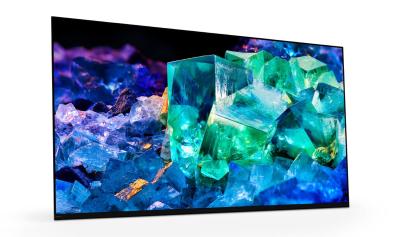
Rtings reports that both QD-OLED displays (Samsung S95B OLED and the Sony A95K) showed signs of image retention, and it seems in general that the QD-OLED displays suffer from worse problems compared to LG's WOLED. Some of Sony's WOLED TVs also showed signs of image retention.
Sony starts shipping its PlayStation VR2 OLED VR gaming headset
Sony's long-awaited second-gen VR headset, the PlayStation VR2, is finally shipping. Sony is offering the new headset for $549.99 in the US, and it is also available globally.
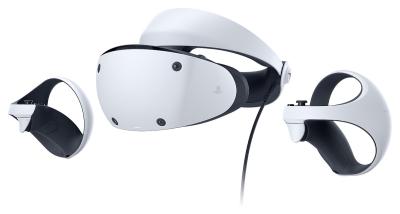
The PlayStation VR2 is based on dual 120fps 2000x2040 OLED displays that provide a 110-degree FOV. This is the first major VR headset based on AMOLED displays for a long time.
Pagination
- Previous page
- Page 2
- Next page
